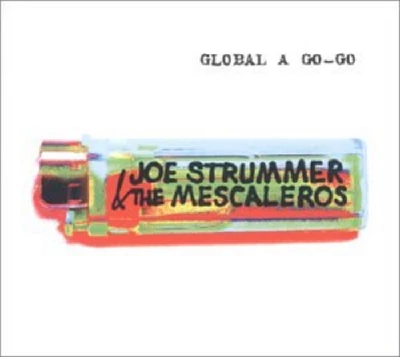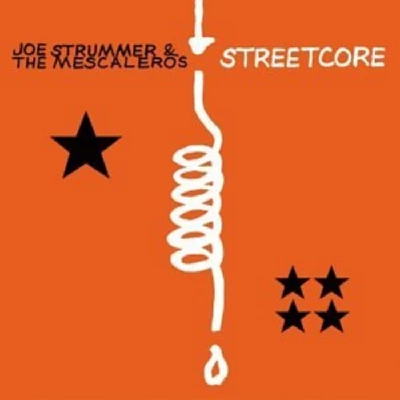Jocasta
-
Joe Strummer
published: 7 /
10 /
2012

With the Clash front man Joe Strummer's final two albums, 2001’s ‘Global A Go-Go’ and the posthumously-released 2003 record ‘Streetcore’ having been reissued to coincide with his sixtieth birthday, Malcolm Carter examines both reissues
Article
Joe Strummer would have been 60 this year but his untimely death in 2002 robbed us of one of the greatest musicians this country has produced. Strummer’s contribution to music has been detailed in many magazines and on many sites so we need not go into that here, but Strummer is remembered by most music fans as the front man of the Clash. His distinctive, sometimes unintelligible, vocals were just part of what made Strummer’s music so unique. Strummer was many things to many people, but he always came across as fiercely passionate in his music.
In the years between disbanding the Clash and his work with the Mescaleros, Strummer took in acting, soundtrack work and even toured with the Pogues. He also worked as a DJ for the BBC World Service, and cut an album with the band the Latino Rockabilly War before forming the Mescaleros in the late nineties. Three albums were released under this band name, ‘Rock Art and the X-Ray Style’ from 1999, 2001’s ‘Global A Go-Go’ and ‘Streetcore’ that was posthumously released in October 2003. The last two albums were released on Hellcat Records.
Earlier this year 57 tracks were made available digitally only under the banner ‘The Hellcat Years’. The Mescaleros three albums were included in the download along with over twenty bonus tracks including B-sides, dub versions and live material. Now ‘Global A Go-Go’ and ‘Streetcore’ are available on CD apparently remastered but these ears can’t tell much, if any, difference from the original CD issues. Not that it matters as although the earlier album, ‘Global A Go-Go’ only contains one bonus song in a live version of ‘Bhindi Bhagee’, while Strummer’s last album ‘Streetcore’ now boasts no less than seven bonus tracks. As the original album always felt a little short at ten tracks. it finally now feels complete.
‘Global A Go-Go’ opens with ‘Johnny Appleseed’, and in this one song alone Strummer captures all that we’ve come to expect and love from his music. This is true World Music. Strummer’s Latin, punk, country, reggae and folk are fused so seamlessly together that he just can’t fail to touch you in some way. Strummer and the band throw in their rockabilly influences into the second song, ‘Cool ‘n’ Out’ and always, of course, there are Strummer’s idiosyncratic vocals demanding your attention. Lyrically Strummer has always been politically sharp but there are moments of humour too, drafting in The Who’s Roger Daltrey to sing an appropriate line or two on the title track can’t help but raise a smile.
There is a feeling of satisfaction surrounding this album. It is as though Strummer was finally happy with the results of his then latest work, and it shines through each and every track. For anyone listening to Strummer for the first time, ‘Global A Go-Go’ is a fine place to start but it is hard to imagine any fan who already owns this album (and they will) actually forking out for the same songs again when the only bonus track is a live recording of a song featured earlier on the album. ‘Bhindi Bhagee’ the song in question, is still an amusing and amazing song which is still throwing up new surprises after more than a decade. Strummer was always experimenting with his music, and on tracks like ‘Gamma Ray’ and ‘Shaktar Donetsk’, he really pushes boundaries; there really wasn’t, and still isn’t, anyone making music that envelops so many styles while not alienating the listener. It all just sounds so right.
But for all Strummer’s experimentation he’ll come up with a more traditional structured song like ‘Bummed Out City’ where his vocals are at their most passionate and affecting. The original ‘Global A Go-Go’ ends with the nearly eighteen minute ‘Minstrel Boy’ which follows on from probably the best song on the album, ‘At the Border Guy’ which recalls the Clash and their reggae excursions. ‘Minstrel Boy’ should have ended this latest version of ‘Global A Go-Go’ too. This Celtic-folk, for the most part almost wordless, song shows yet another side to Strummer and was a perfect way to end an album of such diverse material.
Tagging on just one live song that you’ve heard earlier on the same album just begs the question, why? With the original album running to well over 70 minutes there was little that Hellcat Records could have added anyway so why bother?
The same can’t be said of ‘Streetcore’. The seven songs that are added to the last album that Strummer recorded (some songs were even finished after his sad death) are worth buying the album for again as they paint a brilliant picture of Joe Strummer.
The album starts with what has become one of Strummer’s most popular songs, ‘Coma Girl’. Not only has this song alone introduced a new generation to the work of Joe Strummer it has, due to it not being too far removed from some of the best of the Clash’s work, made those who missed that band the first time around check them out and that can never be a bad thing. The fact is that of all Strummer’s albums after the Clash this is the one that evokes the spirit and sound of that band more than any other, even though some of the songs have a sparser backing than Strummer’s other work with the Mescaleros.
A couple of songs, because of Strummer’s untimely death are also now extremely affecting. Bob Marley’s ‘Redemption Song’ is given a particularly moving reading by Strummer. Recorded by Rick Rubin, there is also a duet between Strummer and Johnny Cash of the song on the ‘Unearthed’ box set that is worth the price of admission alone. The Cash connection continues with ‘Long Shadow’ that Strummer wrote with Cash in mind. The stripped-down version here (a demo?) shows that Strummer was capable of writing for others. Close your eyes and you can imagine Cash singing this song.
If Strummer was working on these songs just before he passed away, it proves that even at 50 years of age he was still passionate about his music, and was producing some of the best work of his long and varied career at that point. The little snatches of dialogue from Strummer’s BBC World Service radio show, which feature on the instrumental ‘Midnight Jam’, will delight those who were fortunate enough to have listened to Strummer the DJ.
But it’s those bonus tracks on ‘Streetcore’ that will have you forking out for the album again. Although they have been available elsewhere before to have them neatly tucked on to the end of ‘Streetcore’ as a kind of potted Strummer history lesson is a real treat. Jimmy Cliff’s ‘The Harder They Come’ is a live version by the Mescaleros which finds Strummer looking over his shoulder once again to the Clash. It is a pretty accomplished version given it is from a gig, and Strummer is in fine vocal form. ‘Rudi, a Message To You’ opens with some banter between Joe and the crowd regarding pork-pie hats before they join in singing the song. Kind of makes you wish you were there…
A live and faithful cover of the Ramones ‘Blitzkrieg Bop’ follows before we are treated to live versions of three songs that were recorded by the Clash, ‘Armagideon Time’, ‘Pressure Drop’ and ‘Junco Partner’ all performed with Strummer and the band’s usual skill and passion, ‘Junco Partner being the best of the bunch.
If the reissue of these albums introduces just a few new ears to the talent that was Joe Strummer they have done their job. They display the man at his very best and come highly recommended.
Picture Gallery:-

